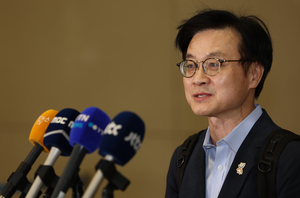 South Korea’s Industry Minister Kim Jung-kwan speaks to reporters at Incheon International Airport on Monday. (Yonhap)
South Korea’s Industry Minister Kim Jung-kwan speaks to reporters at Incheon International Airport on Monday. (Yonhap) South Korea’s Industry Minister Kim Jung-kwan said Monday that Seoul and Washington share a mutual understanding that their bilateral tariff agreement should not put pressure on Korea’s foreign exchange market, adding that the upcoming Asia-Pacific Economic Cooperation summit could present an opportunity for a deal, signaling some progress in the stalled negotiations between the two allies.
“There was a certain level of consensus that the (deal) should not burden Korea’s foreign exchange market. Based on that, the talks were able to resume,” Kim told reporters at Incheon Airport, as he returned from Washington after talks with US Commerce Secretary Howard Lutnick.
Regarding the possibility of reaching a deal in time for the APEC summit to be held next week in Gyeongju, North Gyeongsang Province, Kim said both sides share an understanding that they will seek to make progress during the APEC period, but cautioned against setting a fixed timeline.
“Since the meeting between the two leaders is a rare opportunity, both sides are trying to negotiate using APEC as an opportunity. But we think that what matters more is whether the timing and the content are right,” he said.
US President Donald Trump is set to visit Korea from Oct. 29 to 30 in time for the APEC summit, during which he is expected to meet with South Korean President Lee Jae Myung.
Kim’s trip comes as Seoul is putting all-out efforts into finalizing the framework deal struck with Washington in July. But due to discrepancies over how to structure and finance a $350 billion investment in the US, which Seoul agreed to in return for a reduction in “reciprocal tariffs” from 25 percent to 15 percent, the deal has yet to take effect — leaving South Korean exports subject to steep duties.
The US has been pushing for an upfront cash injection, while the Korean government has made clear it cannot pay the full amount in cash at once. It maintains that the sum should combine direct investments, loans and loan guarantees as agreed in the original pact, citing Korea’s lack of foreign reserves, which, if paid directly, could risk a dollar shortage and financial instability.
Asked whether the US side still demands the entire $350 billion investment in cash, Kim said, “Not to that extent,” adding that such a demand would have made resolving the issue impossible.
“There are aspects where the US side accepted our views,” he said, without elaborating further.
Presidential chief of staff for policy Kim Yong-beom, who joined the talks with Lutnick, said Sunday that the two sides had made “substantial progress” in the negotiations, and that the likelihood of the two countries reaching a tariff agreement at the upcoming APEC summit has increased.
sahn@heraldcorp.com
